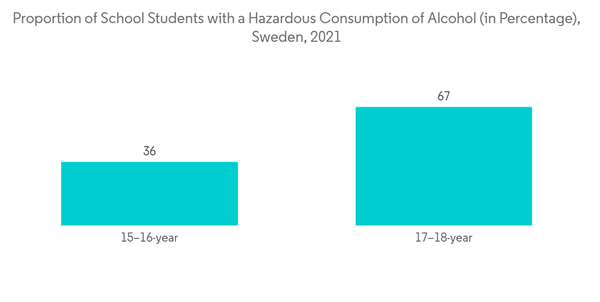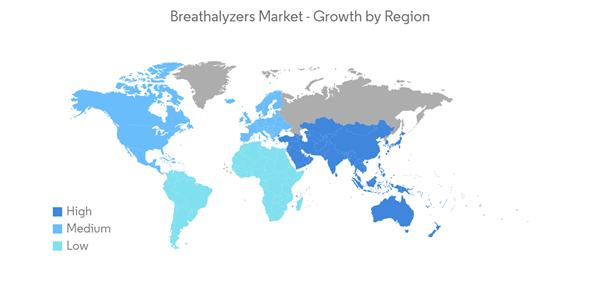COVID-19 impacted the breathalyzers market due to the restrictions to checking the spread of infection due to the SARS-CoV-2 virus in different regions worldwide. The daily routine of the general public was impacted in several ways due to the pandemic, including a ban on travel, closure of bars and restaurants, and closure of other alcohol-selling places. This led to a short-term decline in alcohol consumption, which directly impacted the breathalyzer market. For instance, according to the Europe Economics Report published in April 2021, the overall sale of beer on-trade drastically reduced by 46% to 73 million hectoliters in 2020.
Post-pandemic, the resuming services and opening of restaurants and bars are likely to increase the demand for alcohol, followed by drunk and driving fatalities. According to a report published by the Ministry of Road Transport and Highways, in January 2022, people were killed in drunken driving-related road accidents, accounting for 3.5% of total road fatalities. It showed an increase in deaths compared to 2021. As the conditions are coming to their pre-pandemic state, alcohol consumption and drunken driving cases are increasing, leading to stricter government enforcement and utilization of breathalyzers. This contributes to overcoming the shortfall that the market faced in early 2020. Thus, the market is currently expected to grow and regain its growth pace over the next 3-4 years.
The increasing alcohol abuse and stringent laws for mandatory alcohol testing are expected to drive market growth. According to CDC, in July 2022, approximately 25% of adults had at least one heavy drinking day in 2021. It also reported 1 in 7 pregnant women (14%) reported consuming alcohol within the past 30 days. The prevalence of drinking during pregnancy was highest in the District of Columbia (73%) and lowest in Utah (30%). Additionally, according to National Institute on Alcohol Abuse and Alcoholism, in February 2022, more than 14 million adults have an alcohol-use disorder. People with alcohol-use disease end up with increased chances of getting hurt while driving, swimming, using machinery, or walking in a dangerous area. Thus, the use of breathalyzers by law enforcement officials, as well as those in charge of hazardous area officials, helps them minimize accidents. This will eventually drive the growth of the market.
The other factors that complement the studied market's growth include technological advancements in breathalyzers and collaboration & partnership by market players. For instance, in May 2021, BACtrack launched the BACtrack C8 featuring ZeroLine, the first stand-alone breathalyzer that shows the approximate time to sobriety with every blood alcohol content (BAC) result. Adding this data point to each BAC result considerably impacts health and safety. Such technological advancement is expected to drive market growth over the forecast period.
Thus, the factors such as increasing alcohol abuse and stringent laws for mandatory alcohol testing are driving the growth of the breathalyzers market. However, accuracy issues of the breathalyzers are factors expected to restrain the market growth.
Breathalyzer Market Trends
Fuel Cell Technology Segment Expected to Witness High Growth
Fuel cell technology is anticipated to hold a significant share in the breathalyzers market during the forecast period. This is due to its wide range of advantages, such as the compact size of the device, higher accuracy, longer life, and less requirement of power. According to an article published by Breathalysers Australia in September 2022, a fuel cell breathalyzer sensor can provide consistent and accurate Blood Alcohol Content (BAC) readings from 0.00% to 0.400%. This includes detecting trace amounts of alcohol. Fuel cell sensors are one of the most used breathalyzers in the market to check BAC. Most countries established a legal limit of 0.08 grams of alcohol per 100 milliliters of blood as it is the point at which a driver is considered legally intoxicated. According to the State of California Department of Motor Vehicles handbook, section 26, any driver whose blood alcohol is more than 0.08 is considered inebriated while operating a vehicle and is not permitted to do so. Thus, a constant and accurate BAC reading with fuel cell technology is expected to increase the demand for fuel cell breathalyzers, and thus, drive segmental growth.The manufacturers are concentrating their efforts on enhancing the features of their available breathalyzer devices by incorporating innovative technology. New product launches in the area will boost the growth of the market segment. For instance, in May 2021, Hanwei Electronics Group Corporation launched three new models of breathalyzers: DZ512, AT200, and AT8070. Such enhancement is supposed to drive the segment's growth.
Therefore, owing to the launch of fuel cell technology-based breathalyzers and the high accuracy and reliability associated with them are expected to complement the growth of the studied market segment over the forecast year.
North America Expected to Dominate the Breathalyzers Market
North America holds a significant market share in the breathalyzers market worldwide, mainly due to the high consumption of alcoholic beverages, stringent laws for mandatory alcohol testing, and increased usage of breathalyzers by law enforcement agencies for alcohol and drug abuse. For instance, in the United States, as per the 2022 report from National Institute on Alcohol Abuse and Alcoholism, more than 14 million adults ages 18 and older have alcohol use disorder (AUD), and 1 in 10 children live in a home with a parent who has a drinking problem.Furthermore, according to an article published by Healthline media in July 2022, law enforcement often uses the breathalyzer test to determine whether someone has been drinking and driving. The results of breathalyzers administered by police are used in court. It is a crime to drive with a BAC level of 0.08% or higher per federal standards. Additionally, under Canada's Criminal Code, drivers who refuse to provide a breath sample to a police officer when pulled over under suspicion of impaired driving can be charged with refusing a demand. Also, Mexico's Mobility and Road laws saw permanent breathalyzers and mandatory driver exams. Thus, the usage of breathalyzers by law enforcement agencies for alcohol and drug abuse is expected to drive the market.
Thus, the factors such as high alcohol abuse and enforcement of laws to check BAC are expected to complement the growth of the regional market.
Breathalyzer Industry Overview
The breathalyzers market is moderate in nature due to the presence of several companies operating globally as well as regionally. The competitive landscape includes an analysis of a few international as well as local companies which hold market shares and are well known, including Dragerwerk AG & Co. KGaA, Alcolizer Technology Pty Ltd, BACtrack, Alcohol Countermeasure Systems Corporation, and Intoximeters Inc.Additional Benefits:
- The market estimate (ME) sheet in Excel format
- 3 months of analyst support
This product will be delivered within 2 business days.
Table of Contents
Companies Mentioned (Partial List)
A selection of companies mentioned in this report includes, but is not limited to:
- Dragerwerk AG & Co. KGaA
- BACtrack
- Quest Diagnostics
- Intoximeters Inc.
- Alcolizer Technology Pty Ltd
- Lifeloc Technologies
- Andatech Pty Ltd
- AlcoPro
- Bedfont Scientific Ltd
- Abbott Laboratories
- Alcohol Countermeasure Systems
- Akers Biosciences Inc.










